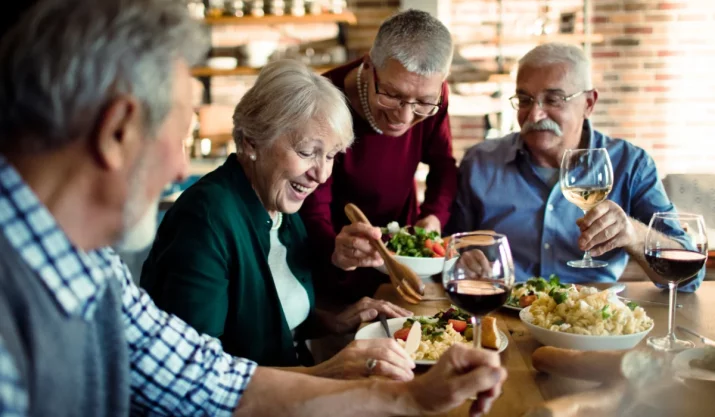Experts Weigh in on How Seniors Can Stay Healthy Through the Holiday Season

Table of Contents
The holiday season is a time for joy, celebration, and gathering with loved ones, but it can also bring unique challenges for those trying to maintain their health and well-being.
In the midst of so many events, it’s easy for healthy habits to take a back seat. To help seniors enjoy the holidays without compromising their health, we’ve gathered insights from dieticians and wellness experts. Here’s what they say.
1. Choose Healthy Pre-Prepared Foods
Kelly Powers, a Registered Dietician and founder of Weeknight Dinners, recommends taking healthy short-cuts to ensure a quick and nutritious meal.
“Rely on items that are pre-washed, pre-chopped, or even pre-cooked! Look for a box or bag of pre-washed salad greens, pre-washed and chopped vegetables, pre-cooked frozen grains, or a rotisserie chicken; these items can be turned into countless meals with ease (and minimal dishes!).”
Powers also suggests taking home a plate of leftovers after a holiday meal.
“Whether at Thanksgiving, Christmas, Hanukkah, or a casual family get-together, there is usually an abundance of food. Ask to take a plate home when you leave. I’m sure your host will be more than happy to send you off with a meal or two!”
2. Focus on Light Movement
Jacquelyn Hackett, a Registered Dietitian and founder of Hackett Health, encourages seniors to stay mobile during the holidays.
“Staying active doesn’t have to be strenuous,” Hackett says. “For seniors with limited mobility, gentle movement such as seated stretching or chair yoga can help improve circulation and reduce holiday stress.”
“Even a short walk after meals, if possible, can aid digestion and boost your mood. Also don’t forget to stay hydrated during the colder months especially after exercising to prevent dehydration.”
3. Opt for Nutrient Dense Foods
Hackett also urges the importance of listening to your body throughout meals.
“During the holidays, focus on practicing mindful eating by truly savoring each bite and listening to your body’s hunger and fullness cues. For seniors, incorporating more protein into holiday meals can help maintain muscle mass and keep you feeling satisfied longer.”
“Choose nutrient-dense options like roasted turkey, beans, and nuts, and remember that it’s okay to enjoy treats—balance is key!”
4. Choose Health-Optimized Holiday Meals
Dr. Leandro Pucci, a Clinical Nutritionist based in Los Angeles, encourages seniors with lifestyle-related diagnoses such as high cholesterol, high blood pressure, and type 2 diabetes to substitute processed foods for healthier options.
“I always advise my patients to choose a health-optimized version of all those Holiday meals,” Pucci says, “All those products that come in boxes and cans should be avoided. These contain excess sugars, starches, preservatives, and so on.”
So, do you have to give up your favorite meals entirely? Well, not quite. Pucci suggests finding healthy alternatives for holiday favorites, and always incorporating colorful veggies.
“Stuffing can be optimized by choosing alternatives to bread. Incorporate other green and colorful vegetables into the selection usually present on these holiday meals.”
5. Prioritize Protein
When it comes to what foods seniors should focus on during the holidays, Pucci encourages high-protein options.
“Always prioritize proteins in the form of lean and unprocessed meats. Protein is essential for optimal health, from supporting muscle growth and repair to regulating hormones and enzymes.”
“Turkey is great, and try adding some dark meat to get more heme iron. Iron is essential for oxygen transport in the blood and prevents anemia.”
“I always prefer half the plate to be protein, “Pucci says, “and ⅔ the other half to be at least three colors in your vegetables and fruit, limiting starches. The remaining should be healthy fats.”
6. Nourish Your Gut Microbiome
Caitlin Beale, MS, RDN, and owner of Caitlin Beale Wellness reminds seniors of the importance of gut health, and how they can take care of it during the holidays.
“The microbiome plays an important role in many functions, including immune health, nutrient absorption, and mood,” Beale says, “The natural changes to the digestive tract that can occur with age coupled with medication use like those that reduce stomach acid or NSAIDs can lead to nutrient deficiencies and digestive discomfort.”
“The best way to support your gut health,” Beale continues, “is to eat enough fiber, especially prebiotic fibers. These fibers feed the beneficial bacteria in the gut, helping to maintain a balanced and thriving microbiome. Foods rich in prebiotic fibers include garlic, onions, bananas, legumes, and whole grains.”
Beale also encourages fermented foods that naturally contain probiotics (healthy bacteria), such as yogurt, miso, kefir, and pickled vegetables.
7. Recognize Stress
When it comes to times of stress, food can be an easy way to cope.
“Travels, family dynamics, or even loneliness related to the season can bring up feelings that may lead to emotional eating, skipping meals, or coping by consuming comfort foods we might not usually eat,” Beale explains.
“To manage stress and maintain a healthy relationship with food, the first thing to do is simply recognize that it’s happening. Stress-related eating habits usually have nothing to do with hunger and have more to do with the feelings or behaviors that lead to your food choices.”
“If you find yourself reaching for snacks or comfort foods during stressful times, try to pay attention to the triggers that prompt these urges.”
8. Listen to Your Body
The holidays are a happy time, but they can also be stressful. Whether you feel food anxiety or are simply feeling overwhelmed by events, Dr. Leandro Pucci encourages staying present and being kind to yourself.
“There is a lot of pressure during the holidays to consume, buy stuff, and do many things that may not be in harmony with our way of thinking or our everyday lifestyle.
All this pressure can get us off-balance, and the result of this unbalance may show as emotional eating as a form of coping mechanism.”
“When one of those feelings is expressed as ‘hunger’ or a ‘craving,’ stop momentarily and reassess the feeling. What do you need? Is it physical hunger, or is it another kind of hunger? The answer always comes when we allow ourselves to ‘listen’ to our body signals.”
Caitlin Beale recommends a similar approach. “Mindful eating is a powerful tool that encourages awareness of hunger cues and eating experiences, helping to prevent overeating,” Beale says.
“Planning balanced meals can ensure you have nutritious food ready to go, reducing impulse choices that may not make you feel good or support your health goals. Incorporating relaxation techniques can also help. Whether it’s walking, dancing, stretching, or calling a loved one, find what brings you joy and use that as a supportive tool instead of food.”
9. Be Kind to Yourself
Finally, Beale emphasizes the importance of being kind to yourself and practicing self-compassion.
“Social support, whether through family gatherings, community events, or online groups, can also help you stay connected, which helps reduce stress.”
Related: Important Questions to Ask During a Senior Health Checkup






